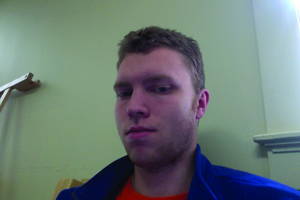

William Bleynat
William Bleynat, a senior at Emory & Henry College, has always loved making up stories. His latest story idea has been accepted for inclusion in "Corvidae L'Estrange," a collaborative steampunk horror anthology.
"I don't think that there was ever any question in my mind about whether or not I wanted to tell stories one day," William says. "Even back when I was a small child, I used to go off by myself and pace back and forth spinning new worlds into existence. When I went to Emory & Henry, I had the opportunity for the first time in my life to make up stories for a grade, and I loved it. My professor (James Harrison) suggested that I start looking for opportunities to write more, and so I did some searching. I found an ad on DeviantArt for a project called "Corvidae L'Estrange.' They were looking for writers to put together a steampunk horror anthology. I've never really paid much attention to the steampunk genre, but I decided to give it a try and they accepted my story idea. Hopefully that should become my first published work by this summer.
"I was very excited when my novella was accepted, because it gave me a chance to not only get my foot in the door as a writer but also really share my stories for the first time. I've never had any work read by more than 20 people. The publication is supposedly going to be sold at Canadian steampunk conventions, and I know nothing whatsoever about the Canadian steampunk scene, but it's going to be cool for me just knowing that somewhere out there a bunch of people whom I've never met will be enjoying my work."
The steampunk genre is defined by the website, Ministry of Peculiar Occurrences, as "an inspired movement of creativity and imagination. With a backdrop of either Victorian England or America's Wild West at hand, modern technologies are re-imagined and realized as elaborate works of art, fashion and mechanics. If Jules Verne or H.G. Wells were writing their science fiction today, it would be considered steampunk."
William's novella is called "The Great Engine." "It's set in a world where the planet's rotation on its axis has slowed dangerously, and the only thing keeping it going is a colossal and very intricate machine," he says. "Two girls get stuck in this machine in the dark with only a very weak light to guide them and no idea how to find their way out. As if that weren't enough, they find that all the maintenance staff in the area has been killed by something in the darkness, and now that something is hunting them. The girls are going to have to find their way out of the great engine before cold, thirst or whatever is lurking in the machine overcomes them."
While on their journey through the great engine, the protagonists will exemplify William's greatest interest in writing, character development, and his action-oriented style.
"I like to have periods of calm and then suddenly ramp up the tension, often without warning. During those periods of calm, I focus a lot on character development and getting the reader invested so that when it all hits the fan I can put people on the edge of their seats. I like to play around with characters, bounce them off each other and try to imagine what they would do in this or that situation. Ironically, the part of writing I most dislike is writing. I love coming up with ideas but actually getting them onto paper and trying to accurately convey what I want to get across is an exercise in frustration sometimes."
William's favorite form of writing is comic books. "I think the medium is woefully undervalued and underestimated. It's an art form that requires a lot more coordination than a regular novel, and there's a whole lot more that can go wrong; but when the writer and artist and editor are hitting on all cylinders, I think it has a lot more potential."
When thinking about writing, William's philosophy goes far beyond specific genres or influences (his are Neil Gaiman and Dan Shive).
"Writing, I believe, is an essential part of every culture that has ever invented it," he says. "Everything in society relies on people's ability to make sense not only of the world around them but also of each other. Telling stories is a way to place yourself in other people's shoes and learn from experiences you haven't personally had. Everybody has had books, movies, plays, speeches, articles or songs that have changed their life in some fundamental way, and all of that is accomplished on the back of writing. Writing for me is a tool to change the world and the way people see each other, as well as a way to present and argue ideas. There's a reason that history and prehistory are divided by the advent of the written word. It's important stuff."
Until William can support himself with his writing, he plans to use his talents in marketing. "I've never had any interest in being a starving artist, so I'd rather stay in a more lucrative field until I'm sure I can support myself. My eventual dream, however, is to own a publishing company for comics."
William is the son of Ed and Anne Bleynat of Asheville, North Carolina.